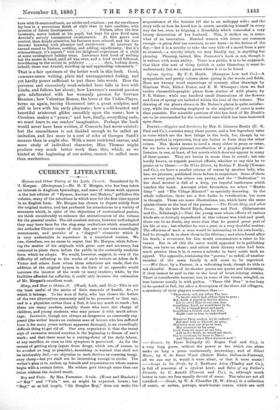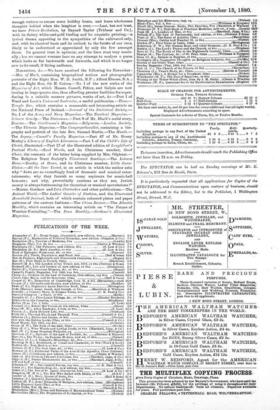POETRY.—Ripples and Breakers, by Mrs. G. Linnmus Banks (C. K.
Paul and Co.), contains many short poems, and a few legendary tales in verse which are the best things in the book, for, though by no moans perfect in expression, they aro better in form than the other verses. Mrs. ljanks seems to need a story either in prose or verse, for we have a very pleasant recollection of a graphic power of de- lineation in one, at least, of her novels which does not appear in many of these poems. They are better in sense than in sound ; but one hardly knows, as regards poetical efforts, whether to say this be to praise or to blame.—In Whin-Bloom, by Robina F. Hardy (Nimmo and Co.), we have a smaller volume of verses by another lady, who has, we presume, published them before in magazines. Some of them are not very good, but others are pretty, and the " Dedication" to her dead mother is full of a deep, yet hopeful tenderness which touches the heart. Amongst other favourites, we select " Martin Gray" and "The Village Minstrel" as specially deserving. In the whole collection, there are a few faults in versification, but none in thought. There are some illustrations, too, which have the same quaint charm as the best of the. poems.—The Pirate Ship, and other Poems. By the late David Blytb, Seaman and Poet. (Edmonstone and Co., Edinburgh.)—That the young man whose efforts of various kinds are so lovingly reproduced in this volume was kind and good, there can be no doubt, any more than that ho passed great part of his life at sea ; but whether he was a poet, is a very doubtful matter. The effusions of such a man would be interesting to his own family, had he thought fit to show thorn in his lifetime; and when found after his death, a reverence for him would communicate a value to his verses. But in all this tho outer world, appealed to in publishing them, can have no share ; and unless their literary value had been much greater than it is, it seems a mistake to have made such an appeal. The appendix, containing the " poems," so called, of another member of the same family is still more to be regretted.
Wet Days, by a Farmer, is a refreshing book, though its title is not cheerful. Some of its shorter poems are quaint and interesting, if they cannot be said to rise to the level of heart-stirring strains. There is considerable humour, too, in some of the verses, mingled, as true humour usually is, with pathos. "Three Old Men" is too long to be quoted in full, but after a description of the three old villagers, a summary of their prayers continues thus :—
" Thou surely wilt not refuse Thy love.
To hearts which had seldom time to pray ; But, Lord, if placed in heaven above,
Let us serve Theo in our own way. Something, Lord, we would have to do,
Fit for a rugged heart and hand, Something a foolish soul, but tree, Might come in time to understand.
Whate'er Thou sendest, we're content ; But deal with us Thyself, we prey, Wherever next our steps be bent,
May overseers be far away.
Lord, from all anger we are free, And on his faults we would not dwell, For to condemn we leave to Thee; And Thomas Jones Thou knowest well."
—Elnora, by Frere Tolingsby (C. Kegan Paul and Co.), is a very long poem, without the power or fire which can alone make so long a poem continuously interesting ; and of Silent Music, by S. de Bonet Wood (Robert Blake, Dalton-in-Furness), all we can say is, would it were silent, or that it were music ! —Songs in. the Strife, by J. Redfearn Aden (Tinsley and Co.), is fall of nonsense of a cynical kind ; and Tales of my Father's Fireside, by C. Arnold (Provost and Co.), is, although much better in tone, we fear equally devoid of sense. The tales are not all versified.—Fends, by W. A. Chandler (E. W. Allen), is a collection of comic, or rather, perhaps, mock-heroic verses, which are well
enough written to amuse some holiday hours, and leave wholesome thoughts behind when the laughter is over.—Last, but not least, we have Prince Deukalion, by Bayard Taylor (Trfilmer and Co.), with its dainty white-and-gold binding and its exquisite printing,—a lyrical drama appealing to the sympathies of the cultivated only, and, with its classical basis and its outlook to the fatute of our race, likely to be understood or appreciated by only the few amongst these. Its general tone is optimist, and the lines read very music- ally ; but we cannot venture here on any attempt to analyse a poem which looks so far backwards and forwards, and which is no longer new to its small, if fitting audience.



































 Previous page
Previous page